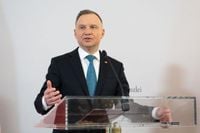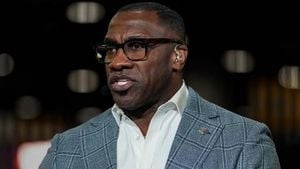Poland is gearing up for a pivotal presidential election as the political landscape shifts dramatically in the lead-up to the first round of voting scheduled for May 18, 2025. With current polls indicating that Rafal Trzaskowski, the mayor of Warsaw and a member of the Civic Platform party, is likely to win, the dynamics of the race have become increasingly complex.
Recent developments have seen Trzaskowski strategically positioning himself to appeal to voters across the political spectrum, particularly those on the right. His efforts come amid a backdrop of populist measures introduced by Donald Tusk, the leader of Civic Platform, who announced on March 27 that Poland would suspend the right of migrants on the Polish-Belarusian border to claim asylum. Tusk also declared that Poland would no longer adhere to various EU laws on migration, including the Dublin Regulation and the Pact on Migration and Asylum.
As a result, Trzaskowski's statements regarding benefits for Ukrainian refugees are part of a calculated move to solidify his appeal among voters who might otherwise lean towards more conservative options. Current polling shows Trzaskowski with a support rate of 36-37 percent, while his main competitor, Karol Nawrocki, endorsed by the ruling Law and Justice party (PiS), stands at approximately 25 percent.
However, the race has become more competitive with the rise of Slawomir Mentzen, the candidate from the far-right Confederation alliance, who has surged from around 10 percent support to 19-20 percent in recent weeks. Ben Stanley, a political analyst from SWPS University, notes that while Trzaskowski is currently favored to win, the increasing popularity of Mentzen poses a potential threat. "If current trends were to continue, Mentzen could reach Nawrocki, but that really depends," Stanley commented, highlighting the volatility of Mentzen's young, male voter base from small towns.
Despite Mentzen's rise, analysts believe he may struggle to maintain his support as the campaign progresses. Stanley remarked, "Mentzen might actually have a ceiling for his support... he might not manage so well" when faced with the detailed scrutiny that comes later in the campaign.
The likelihood of a second round of elections appears strong, with Stanley projecting that in such a scenario, Trzaskowski would secure 56 percent of the vote against Nawrocki's 44 percent. This sets the stage for a high-stakes battle where Trzaskowski must navigate the political landscape carefully to avoid losing ground.
Nawrocki, currently the head of the Institute for National Remembrance, has focused his campaign on themes of security and immigration, often invoking historical parallels to bolster his arguments. On April 9, he challenged Trzaskowski to a debate focusing on national security, which resulted in two separate events that highlighted the confusion and competition among the candidates.
During these debates, the candidates clashed over various issues, with Trzaskowski emerging as the favored candidate in a viewer poll conducted after one of the debates. Gavin Rae, a sociologist at Kozminski University, notes that the candidates are competing primarily on issues of war and immigration, with Nawrocki struggling to differentiate himself from Tusk's rightward shift on these topics.
Rae described Nawrocki as a "not likeable candidate and shady character," raising questions about PiS's decision to nominate him. He speculated that Nawrocki's candidacy might be a strategic choice to maintain party unity amid internal divisions as PiS leader Jaroslaw Kaczynski’s influence wanes.
Meanwhile, the campaign has seen a notable absence of pro-social messaging that previously bolstered PiS's support. Rae pointed out that while the party once garnered support from core voters through social benefits, the current election cycle has seen a departure from these themes, which may alienate potential voters as living standards decline.
As the election approaches, Mentzen's candidacy raises concerns about the normalization of far-right rhetoric in Poland. Rae emphasized that while mainstream candidates attempt to co-opt right-wing themes, they risk losing voters to more radical alternatives. Olena Babakova, a Ukrainian journalist, echoed this sentiment, warning that adopting alt-right arguments on migration could lead to long-term electoral consequences for traditional parties.
In parallel with the presidential race, Poland's geopolitical environment remains tense. On April 16, President Andrzej Duda condemned Russia for its "bloodthirsty imperialism" following threats made by Russia's Foreign Intelligence Service Director Sergey Naryshkin, who claimed that Poland and the Baltic states would be the "first to suffer" in a potential NATO conflict with Russia.
Duda characterized Naryshkin's threats as "classic Russian misleading disinformation" and reiterated the importance of NATO in ensuring security against Russian aggression. He called for Western nations to bolster their defense capabilities, stating, "Strengthening Euro-Atlantic ties, modernizing our armies so that the deterrence potential is real in our countries — this is the only effective policy that should continue to be implemented calmly and consistently."
As the political landscape in Poland evolves, the interplay between domestic electoral strategies and international security concerns will undoubtedly shape the outcomes of both the presidential election and Poland's role in the broader geopolitical arena. With the first round just weeks away, all eyes will be on the candidates as they navigate these complex issues, vying for the support of an increasingly polarized electorate.




